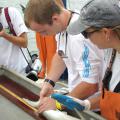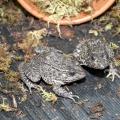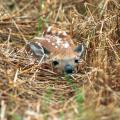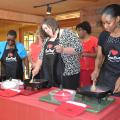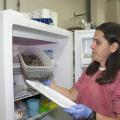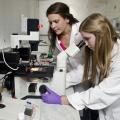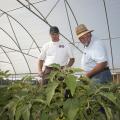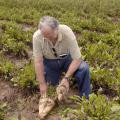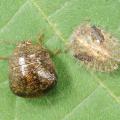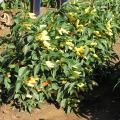Feature Story from 2013
JACKSON – After school, most kids raid the kitchen before they hit the books. If fruit is not one of their favorites, a few simple recipes and a little planning can help kids make better snacking decisions.
“Kids probably won’t choose to eat an orange if they have to do the work of peeling it before they eat it,” said Dawn Vosbein, registered dietitian and family and consumer science agent with Mississippi State University’s Extension Service in Pearl River County. “If there is cut up fruit already in the fridge, all they have to do is grab it.”
JACKSON – As the carefree days of summer vacation quickly come to a close, parents should take steps to keep their kids safe as they return to the routines of school.
“Parents should keep in mind there are precautions to take no matter how their child gets to and from school,” said Beth Bell, Tallahatchie County child and family development agent with Mississippi State University’s Extension Service.
MISSISSIPPI STATE – A 4-H program created in the South is training the nation’s next generation of responsible landowners, land managers and wildlife professionals.
The Wildlife Habitat Education Program began in Tennessee in 1978 as a way to teach 4-H’ers the fundamentals of wildlife science and how to manage habitats to benefit different animal species. In addition to general information about wildlife and conservation, participants participate in contests to test their individual knowledge and their ability to work as a team to create a wildlife management plan.
STONEVILLE – Mississippi State University scientists looking to help catfish producers keep costs low and quality high have found catfish can thrive for the first six weeks after hatching by feeding on naturally occurring zooplankton.
Several aquaculture researchers at MSU’s Thad Cochran National Warmwater Aquaculture Center compared the growth and survival of two groups of recently hatched catfish, called fry. Both groups were raised in ponds, but for six weeks, one group ate commercial feed daily while the other group did not.
MISSISSIPPI STATE – Mississippi State University has joined the ranks of conservationists trying to increase the population of one of the most critically endangered species living in North America.
Mississippi gopher frogs are native to south Mississippi, and for a time, the only known colony living and breeding in the wild was living in one Harrison County pond. They have since been found living near three other ponds in the DeSoto National Forest, bringing the total known wild population to an estimated 100-200 gopher frogs.
MISSISSIPPI STATE – Every summer, nature enthusiasts come across baby animals they think are orphans, but most of the time, these young animals have not been abandoned.
Fawn births in Mississippi peak in July and August but many are born from May through October. Wild hogs can have one to three litters per year, depending on circumstances, so it is not unusual for people to encounter young wild animals.
STONEVILLE – Irrigation and precision agriculture were hot topics for corn and soybean growers and crop consultants who gathered in Stoneville for a July 18 event.
Mississippi State University scientists and Extension specialists shared current research findings and ongoing efforts to determine the best production methods at the annual Corn and Soybean Field Day.
MSU’s Delta Research and Extension Center hosted the event to address numerous agronomic issues.
MISSISSIPPI STATE – Some of the nation’s leaders in the field of robotics will be at Mississippi State University August 11-15 for the first 4-H Robotics Academy.
The workshop is open to 4-H agents, volunteers, teachers and senior 4-H’ers, and will train them in the ROBOTC and NXT-G programming languages.
The 4-H Robotics Academy will be at the Bost Extension Center’s Building B. At the end of the week, participants can take an optional exam for certification by the National Robotics Academy.
MISSISSIPPI STATE – Muscadine grape growers can hear about the latest research and see fruit on the vine at Mississippi State University’s McNeill Experiment Station in Pearl River County on Aug. 24.
MISSISSIPPI STATE -- A Mississippi State University administrator has been named a fellow in the American Chemical Society’s Agricultural and Food Chemistry Division.
Sam Chang, head of the Department of Food Science, Nutrition and Health Promotion, will be honored at the 246th annual meeting of the American Chemical Society in Indianapolis in September.
JACKSON – Families can find it difficult to eat healthy and watch their wallets while meeting the demands of everyday life.
Mississippi State University’s Extension Service family and consumer sciences educators can help.
CANTON – The filmmaking process recently came to life for 13 4-H’ers who attended the Canton Young Filmmakers Workshop.
With instruction from experienced film students and professionals, teens from George, Pontotoc, Greene and Union counties spent six days conceiving, writing, filming and editing a 3- to 5-minute video. A 4-H Tech Wizard grant funded their participation in the camp. The grant enables children of military families from three areas of the state to attend the camp.
MISSISSIPPI STATE – Mississippi State University researchers successfully promoted egg laying in threatened Boreal toads when they moved the amphibians out of the refrigerator and into the wine chiller.
Mississippi Agricultural and Forestry Experiment Station researchers at MSU are working with a group of 52 threatened Boreal toads native to the Colorado Rockies. The toads are housed in a special lab in the MSU Department of Biochemistry, Molecular Biology, Entomology and Plant Pathology.
MISSISSIPPI STATE -- Their classmates may be taking the summer off, but two undergraduate students at Mississippi State University are spending long hours in a laboratory conducting studies that would challenge seasoned researchers.
Their supervisor, Erdogan Memili, is not surprised. He nominated Alexis Parisi and Kate Thompson for National Science Foundation research programs for elite undergraduates.
MISSISSIPPI STATE – An experienced leader in the child development field has been named the new director of the Child Development and Family Studies Center at Mississippi State University.
Melissa Tenhet accepted the permanent position in the College of Agriculture and Life Sciences after serving as the center’s interim director for three months. She will also teach part-time as an instructor of human development and family studies in the School of Human Sciences.
MISSISSIPPI STATE – A partnership between two Mississippi State University alumni and the Mississippi Band of Choctaw Indians is bearing fruit under three hoop houses next to Conehatta Elementary School.
For 10 years, Dick Hoy, Class of 1976, and Jim McAdory, Class of 1998 and an MSU Extension agent for the tribe, have been exchanging tips on agriculture and greenhouse operations. This year, they broke ground on the first of at least three school-based farms designed to teach students about gardening and healthier eating.
STONEVILLE – Energy beets could be the answer to Mississippi farmers’ quest for off-season income and provide an alternative energy source for the nation’s expanding biofuels markets.
Mississippi State University researchers and Extension agents are examining the growth and profit potential for varieties of energy beets, a nonedible relative of sugarbeets used only in biofuel production.
Belzoni -- Landowners who want to branch out and earn extra income can attend a Natural Resource Enterprises Business Workshop Aug. 15.
Hosted by Mississippi State University, the workshop offers attendees the opportunity to learn different ways to make more money from their land. Topics include recreational businesses, managing wildlife such as waterfowl and wild hogs, marketing, cost-share programs and reducing liability.
MISSISSIPPI STATE -- The kudzu bug is a nonnative insect that is becoming a management headache in soybeans and a pest in houses after just one year in the state.
The insect was first found in Georgia in 2009 and quickly spread to Mississippi and six other Southeastern states. By the end of July, it had been found in 17 Mississippi counties in kudzu, and seven of these counties had the bugs in soybeans.
JACKSON – The vegetable garden’s homegrown goodness can last well into the fall and early winter with proper care.
Summer vegetables, such as tomatoes, squash, cucumbers and peppers can all be replanted this time of year for a second harvest, said Rebecca Bates, Mississippi State University’s Extension Service coordinator in Lincoln County.
Pages
Feature Story Archive
- 2024 (111)
- 2023 (114)
- 2022 (116)
- 2021 (105)
- 2020 (141)
- 2019 (127)
- 2018 (141)
- 2017 (199)
- 2016 (242)
- 2015 (320)
- 2014 (358)
- 2013 (374)
- 2012 (344)
- 2011 (248)
- 2010 (239)
- 2009 (229)
- 2008 (189)
- 2007 (210)
- 2006 (199)
- 2005 (224)
- 2004 (218)
- 2003 (228)
- 2002 (177)
- 2001 (184)
- 2000 (190)
- 1999 (182)
- 1998 (179)
- 1997 (188)
- 1996 (58)
- 1995 (36)



